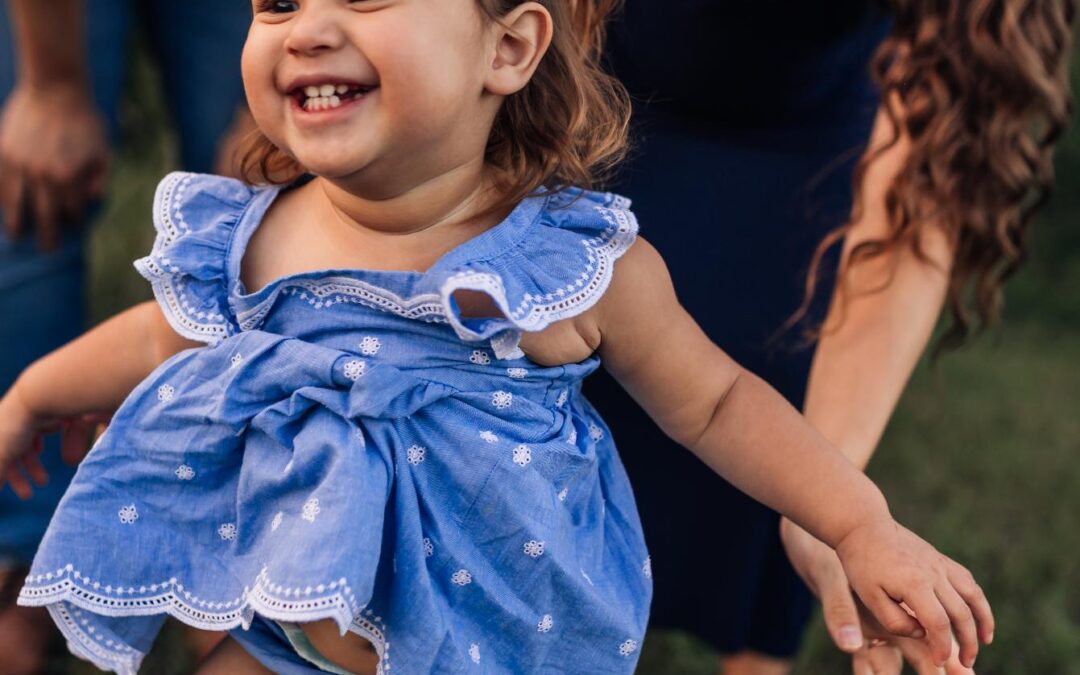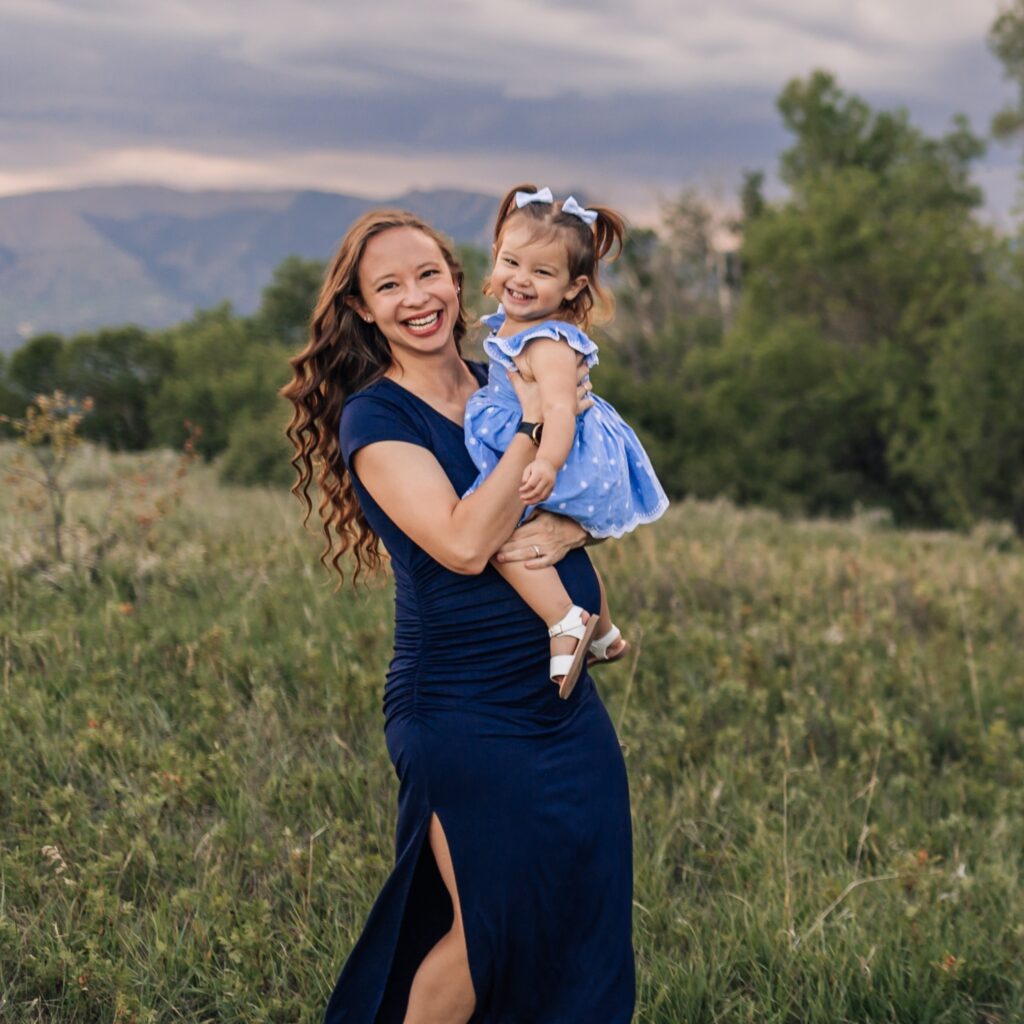Gentle Parenting Defined
According to the Cleveland Clinic, the goal of gentle parenting or positive parenting is, “to raise confident, independent and happy children through empathy, respect, and understanding, and setting healthy boundaries.”
To be successful, this approach revolves around age-appropriate development by improving a child’s self-awareness through a better understanding of their behavior. In other words, the goal is to be a coach for your child, meeting them where they are developmentally, and explaining that their actions (good or bad) will result in X, Y, or Z.
For example, this morning my toddler went to unbutton her little sister’s onesie when I was changing her diaper. I gently put my hand on her hand and asked that she not unbutton her onesie because if she did her little sister would be cold and sad. My toddler looked at me and again tried to unbutton the onesie. Again, I asked that she not do that because her little sister would get cold and cry because she was sad.
My toddler eventually stopped trying to unbutton her little sister’s onesie, but I had to redirect her attention to helping me by throwing her sister’s dirty diaper in the trash to avoid a cold and crying baby.
Professionals in the fields of healthcare and psychology agree that gentle parenting is most beneficial to your child’s mental and emotional health in comparison to traditional parenting which utilizes a positive and negative rewards system. Additionally, it is said that gentle parenting can also have a positive impact on the long-term relationship between you and your child.
What parent doesn’t want that?

One Kid Gentle Parenting
After having our first, I knew I wanted to give gentle parenting a try. At times, I have been known to have a short fuse and get frustrated when I feel I am no longer in control of things; but I knew I didn’t want my kids growing up to be afraid of me or their dad. I wouldn’t say it was easy to do, but I learned how to be better at it as we went. I practiced a hybrid form of parenting combing gentle parenting and the traditional style of parenting at best. I caught myself delivering a small pop to the bottom or raising my voice when my firstborn did something that probably scared me more than anything, but I was really trying not to resort to bad habits.
When you only have one kid, as parents, you outnumber the small humans so it is easier to trade off, when one parent gets frustrated you can tag the other parent in. It’s a beautiful system and my husband and I thrived on it.
We would trade off redirecting and affirming good behavior. Not to mention, our firstborn had our undivided attention allowing us all the time in the world to explain bad behavior and the feelings associated with it.
Two-Kid Gentle Parenting
So when we started discussing having a second kiddo, I didn’t think about how our parenting dynamic would change when it came to gentle parenting; but let me tell you, it changed!
I believe my husband and I are both struggling a bit with the adjustment to two kids. Although, I believe I have allowed my frustrations to get the best of me more than my husband has often resorting to the traditional form of parenting in the past couple of weeks.
I catch myself counting out loud to my toddler as a warning that if she does not stop what she is doing she is going to get in trouble. Usually, she quickly stops what she is doing and runs away.
I know, mother of the year award, right here; but at times I don’t know what else to do. I am feeding the baby, changing the baby, or who knows what and I see my toddler doing something she knows she is not supposed to and I just lose it.

I am getting better at utilizing gentle parenting techniques when my toddler is within arm’s reach of me. Whereas, I seem to resort to the traditional parenting strategy when she is far away from me and I have no ability to control what she is doing.
So the moral of the story is that gentle parenting with two is hard.
I am trying to be better at giving my toddler activities to do such as coloring or toys to play with when I am feeding or changing the baby so she is less likely to do something that I may snap at her for.
To be honest, I often allow her to watch TV, especially in the mornings after a sleepless night with the baby. It makes my toddler more agreeable and gives me a little break.
I am sure there are some parents reading this thinking, I can’t believe she is using the TV to make her daughter more agreeable; but here’s the thing, it works and if it works I am going to use it.
Now, I don’t want to abuse it; but the TV is a tool that parents can use. So I am going to use it when I need it; and as it stands, I am in the season of needing the TV more with having a newborn.
Apologize when Necessary
For me, this is most important, as I said above, since having our second child, I have found myself resorting to the traditional style of parenting using negative rewards for bad behavior more often.
It is important to acknowledge our “wrongdoings” as parents and apologize. I have approached my toddler many times even with tears in my eyes telling her I am sorry and what I did was not okay. I always first apologize, acknowledge my bad behavior, explain my emotions, and follow it up by telling her how much I love her.
I will be the first parent to admit that I am not great at gentle parenting, but I am trying. I think there is a time and place for the traditional style of parenting such as situations when your child may be putting their life in danger having a sense of fear from those situations is beneficial. However, the traditional style of parenting becomes repetitive and benign for day-to-day situations and is often not warranted. So when I find myself in day-to-day situations utilizing traditional techniques I am quick to apologize to my toddler for my behavior and she is sweet enough to forgive me.

So Keep Trying
Gentle parenting is hard with any amount of kids as you navigate the best way to speak, teach, and grow with your child; but it is possible. When your child is upset, I have found it is best to try to calm your child down before trying to talk to them. Otherwise, your words are wasted on deaf ears and frustration begins to settle in.
When trying to gentle parent with multiple kids, I suggest trying to give your kids activities to complete when they seem keen on trying to get into trouble. Redirect them to a better activity to set yourself and your child up for success.
Gentle parenting may seem daunting, but if you try to break it down into simple tasks such as calming yourself first by taking a deep breath, and then calming your child before talking to them, it seems more doable; and when you fail, acknowledge those failures to show your child that you can make mistakes too. Allowing yourself the ability to make mistakes allows them to do the same; and at the end of the day, know you are teaching your kids how to be good little humans and we need more of those in the world.


